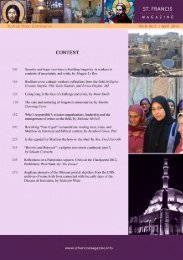download the pdf - St.Francis Magazine
download the pdf - St.Francis Magazine
download the pdf - St.Francis Magazine
You also want an ePaper? Increase the reach of your titles
YUMPU automatically turns print PDFs into web optimized ePapers that Google loves.
<strong>St</strong> <strong>Francis</strong> <strong>Magazine</strong> Vol 8, No 4 | August 2012<br />
cultural norms be accommodated (Lewis 2004b) or broken (McNeal<br />
2007)<br />
Such consideration also needs to extend to lived experience<br />
around and beyond <strong>the</strong> local mosque. The recent literature concerning<br />
women’s lived experience, cited above, has enriched consideration<br />
of o<strong>the</strong>r sites such as Sufi shrines (S. Kim 2010) and, of course,<br />
within <strong>the</strong> domestic sphere (cf., also, Asad 2009a). Simultaneously,<br />
Islam needs to be considered as a religion, and as a political-spatial<br />
ideology (cf., e.g., Schlorff 2006: 97-98, 143-146).<br />
Taken toge<strong>the</strong>r, <strong>the</strong>se observations will help expose some of <strong>the</strong><br />
debate’s dichotomies as false, and o<strong>the</strong>rs will be found to be valid<br />
under more rigorous examination. Is it true, for example, as Asad<br />
(2009b: 139) proposes, that ‘[o]nly when we rid ourselves of <strong>the</strong><br />
notions of “Church” and “Christian” as “bounded” sets can we begin<br />
to appreciate God’s sovereign, albeit confusing work among Muslims<br />
today’ Clearly a spectrum of strategies is better analytically<br />
and critically than a polarity of extractionism or remaining a Muslim<br />
(cf. Schlorff 2006: 141-143, 149-188; n.n. 2010a: 405). Any<br />
communication of <strong>the</strong> faith requires explanation of, and contention<br />
for, <strong>the</strong> meaning of <strong>the</strong> content of <strong>the</strong> faith (<strong>St</strong>ringer 2010: 592).<br />
But not everything is falsely dichotomous. Western Christians<br />
need also to practice self-reflective repentance and maturation. For<br />
instance, each of us needs to consider whe<strong>the</strong>r ‘<strong>the</strong> “measurement”<br />
of salvation’ via “cognition-centered measurement... articulated primarily<br />
in specific belief statements” is, at least in part of, even possibly<br />
“typical” of our “modern western Christianity.” (Higgins 2007:<br />
34) If we can see something of ourselves in this description, or if<br />
some of <strong>the</strong> o<strong>the</strong>r related critiques C5 issues regarding western<br />
Christianity reveal something lacking or idolatrous within our own<br />
appreciation of salvation, <strong>the</strong>n do we need to be gently critiqued<br />
Do we also need to be corrected, even rebuked, by o<strong>the</strong>rs so that we<br />
might be more biblically complete and pure – in a word, holy Also,<br />
in <strong>the</strong> spirit of Acts 15, Higgins (2007: 35) raises <strong>the</strong> issue of ‘christian’-background<br />
believers making concessions in lifestyle for <strong>the</strong><br />
sake of unity among believers. Nikides (2009: 113) also proposes<br />
<strong>St</strong> <strong>Francis</strong> <strong>Magazine</strong> is a publication of Interserve and Arab Vision 494







![Reflections on Surah Fatiha and the Lord's Prayer[1] - St.Francis ...](https://img.yumpu.com/49377951/1/184x260/reflections-on-surah-fatiha-and-the-lords-prayer1-stfrancis-.jpg?quality=85)









